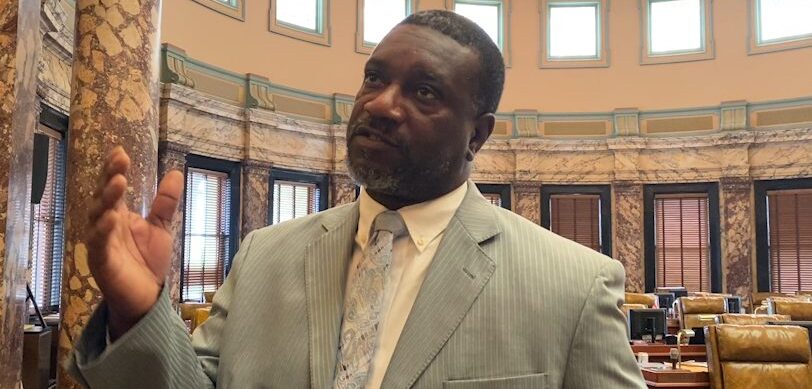
Mississippi State Penitentiary (MDOC)
- In 2021, Mississippi expanded parole eligibility, giving new inmates access to a second chance. So far, the number returning to prison is down.
As a teenager, Michael Moore was convicted of armed robbery and sentenced to a mandatory 20 years in prison. Moore struggled with addiction and fell in with the wrong crowd. After serving 19 years of his time, he became one of the first persons released under parole reforms signed into Mississippi law in 2021.
He’s thankful for the year he received back and credits a strong support network for his success since leaving prison. Today, Moore has a steady job. He’s recently married. He preaches about redemption and teaches about his experience.
Moore told Magnolia Tribune that parole is not for everyone, acknowledging that he had fellow inmates that pose a danger to the public. But he says recent reforms are lifechanging for those who do the hard work of improving themselves.
New Law Gives Second Chances
The Mississippi Earned Parole Eligibility Act, SB 2795, gave Moore and others who were previously ineligible for parole a second chance. The law, which took effect in July of 2021, made non-violent offenders eligible for parole after 25 percent time served.
Violent offenders gained eligibility after 50 percent time served, with the exception of armed offenses, which require 60 percent time served before eligibility.
Eligibility means the State Parole Board can consider whether an inmate is rehabilitated and ready to rejoin society. The Parole Board maintains full authority to reject applicants.
The law also excludes certain crimes from parole eligibility, including murder, adult sex crimes, habitual offenses, and drug and human trafficking.

State Senator Juan Barnett (D), who authored the bill, told Magnolia Tribune the intent of SB 2795 was to shorten prison times for those who put forth the effort to earn parole.
When parole is denied, Senator Barnett said State Parole Board members may make suggestions to the inmate about classes or courses they can complete before the next hearing to increase their chances for release.
Barnett believes effective use of parole is not only in the interest of rehabilitated inmates, but ultimately the state’s finances.
The cost to house an inmate is $51 per day, a rate Barnett says can add up, especially when a person sentenced for 30 years may have taken $10 from a victim.
“I think that’s costing us a lot when that person could have been rehabilitated and put their life back together in 10 years, but we’re going to hold them for 20 more years,” Barnett described.
By the Numbers, Before and After
Following the passage of Earned Parole Eligibility Act, Mississippi experienced a roller coaster in paroles granted. As new individuals became eligible, parole applications and approvals spiked to close 2021. Beginning in the second quarter of 2022, the number of those granted parole declined to roughly half of the number being paroled prior to the passage of SB 2795.
| Quarter – Year | Significance of Quarter | Total Paroles |
|---|---|---|
| 2nd Quarter – 2021 | Last Quarter Before 2795 Took Effect | 919 |
| 4th Quarter – 2021 | High Water Mark | 1389 |
| 3rd Quarter – 2022 | Low Water Mark | 424 |
| 3rd Quarter – 2023 | Return to Pre-Reform Numbers | 849 |
By the end of 2023, parole numbers began to rise to levels similar to the numbers granted before the law took effect.
Senator Barnett attributes the fluctuation in total paroles to changes that have occurred on the Parole Board since reforms took effect. New members, Barnett said, require time to become acclimated to the process.
Tony Smith, who served on the Parole Board from 2020-2023, agreed with Barnett’s assessment. Current State Parole Board Chair Jeffrey Belk was appointed to the position by Governor Reeves in January 2022.
Julia Norman also joined the five-member Parole Board in 2022.
A Stringent Approach to Violent Offenders, Focus on Recidivism
Even though SB 2795 now provides some violent offenders with access to parole, Norman said a lot of consideration goes into those.
“It’s not a ‘we don’t parole violent offender policy,’ but statistically, if you harm people or have a history of violence that’s one of the more difficult things for the Parole Board to deal with,” Norman described.
According to the Corrections and Criminal Justice Oversight Task Force Annual Report released in January 2024, an average of 17 percent of total parolees are violent offenders since the shift in Parole Board composition.
Norman says the Parole Board takes efforts to keep recidivism down and protect public safety seriously. Between SB 2795’s effective date and October 31, 2023, 18.9 percent of those paroled under the law returned to prison.
Just 2.7 percent of parolees, or 56 individuals, returned to prison after being sentenced for a new crime.
The Task Force Annual Report says “revocations to prison, particularly parole revocations, are down by 47 percent.”
Alesha Judkins, the Mississippi State Director of Fwd.Us, an organization focused on criminal justice reform, said the low rates of recidivism are proof the law is working.
Judkins told Magnolia Tribune that “data-driven policies, like parole, are a critical and proven tool to reduce Mississippi’s dangerously high prison population, without compromising public safety.”
“Ninety-eight percent of people who were made eligible by the 2021 parole reforms did not return to prison on a new sentence in the two years after release,” Judkins continued. “Giving incarcerated Mississippians an opportunity to earn their way home reunites families, boosts the state’s workforce, and strengthens our communities.”
Judkins also noted that crime rates overall had been falling from highs experienced during COVID, pointing to FBI data that showed a 15.9 percent drop in violent crime and a 26.4 percent drop in homicides in Mississippi between 2020 and 2022.
Weighing the Risks
According to Norman, a number of factors are considered when Parole Board members hold a parole hearing, including if the inmate is affiliated with a gang, their history, the crime committed, the inmate’s behavior while incarcerated, and any classes or programs they are taking while in prison.
“I think that we’re doing a good job of reviewing the actual offender and not just looking at the crime,” Norman said.
Norman added that Parole Board members also take into consideration the level of community support a potential parolee may or may not have outside of jail. Individuals with a strong support system in the form of family and a job are more likely to succeed, while those without that support may not fare as well.
There’s also the history of the inmate’s behavior outside of MDOC custody that must be considered.
“If you have a history of violence, and you haven’t been successful on probation and you haven’t been successful on parole and you haven’t been successful on house arrest and you just tested positive last month for drugs, it’s not reasonable for me to believe you’re going to be successful on parole,” Norman added.
Norman emphasized the importance of a robust support system outside of prison for individuals being released.
It’s a point that Michael Moore agreed with strongly.
“Had I not had a family support system, I would have failed.”










